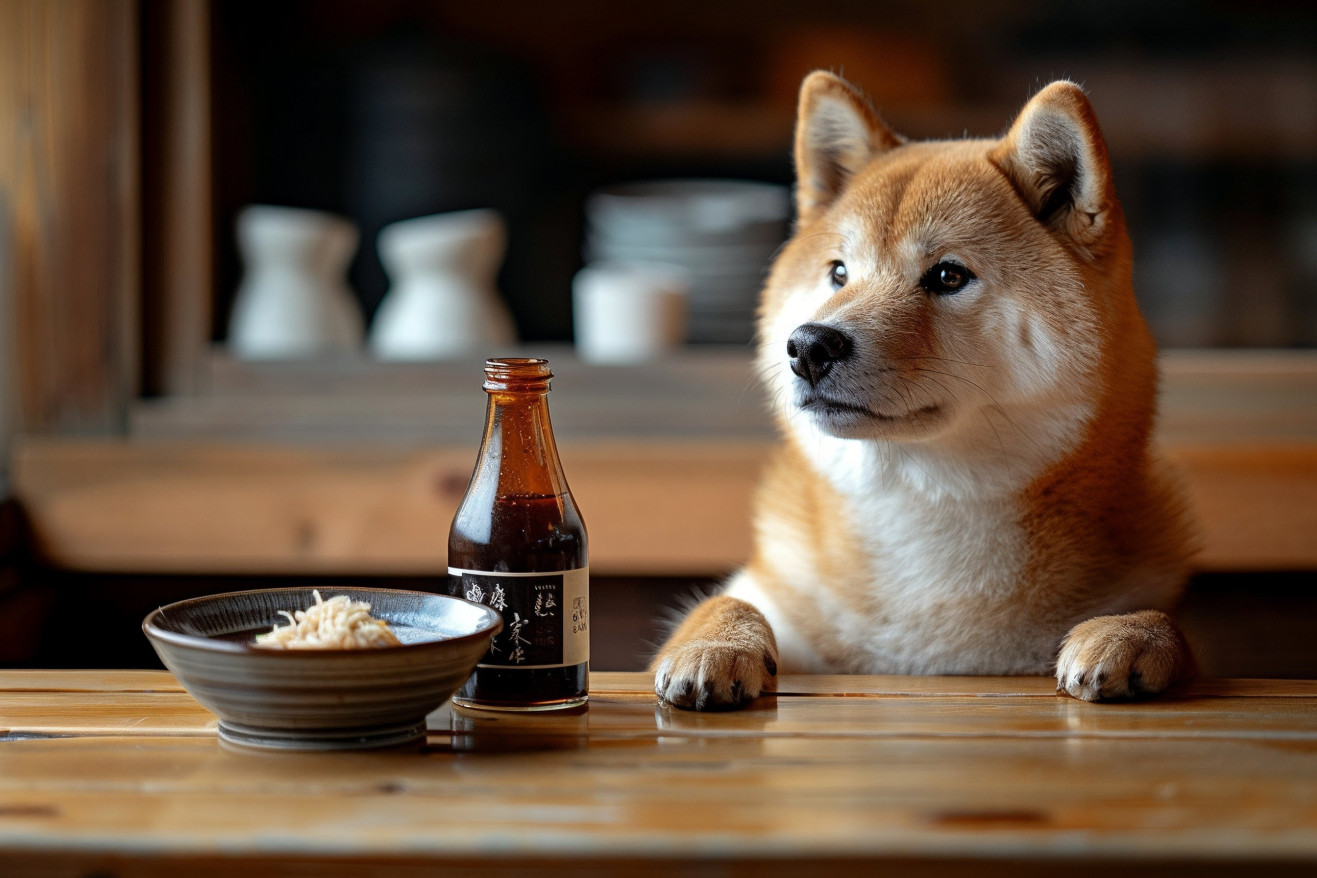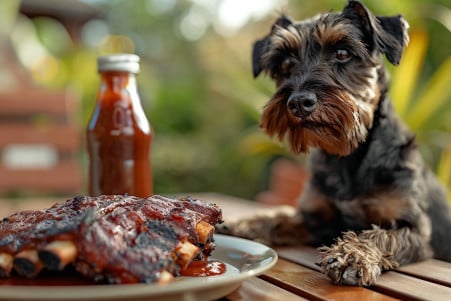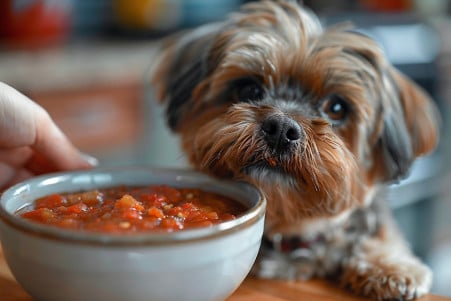Can Dogs Have Soy Sauce? Understanding the Risks and Safe Alternatives
12 February 2024 • Updated 12 February 2024

Soy sauce is a common ingredient in many households, but is it OK for your dog to eat? No, dogs cannot have soy sauce because the high levels of sodium in soy sauce can cause salt poisoning, which can result in symptoms like excessive thirst, vomiting, and diarrhea.
Even small amounts of soy sauce can be dangerous to dogs. Make sure to keep soy sauce away from your dog and contact your vet if your dog consumes soy sauce.
In this comprehensive review, we will take a deep dive into the world of veterinary science and animal nutrition to learn about the impact of soy sauce on dogs. We will look at how dogs metabolize high-sodium foods and explore case studies on salt toxicity.
We will primarily focus on canine physiology, the signs and symptoms of salt poisoning, and the clinical treatment recommendations. This information will give you the knowledge you need to make the best choices for your dog’s health and well-being.
Can dogs have soy sauce?
Soy Sauce Is High in Sodium
Sodium is an essential part of a dog’s diet because it helps with nerve and muscle function. That said, it’s important to remember that like with humans, too much sodium can be a bad thing.
According to Top Dog Tips, just one tablespoon of soy sauce contains 1,000 milligrams of sodium, which is way more than the recommended daily intake for dogs. This imbalance in sodium levels can lead to a number of health issues, including salt poisoning, which is a medical emergency.
Symptoms of salt poisoning include vomiting, diarrhea, increased thirst, and in severe cases, seizures. According to Spoiled Hounds, these symptoms are the body’s way of trying to rid itself of the salt. That said, this can quickly turn into a dangerous situation.
If a dog has ingested soy sauce, it’s important to keep a close eye on them and make sure they have plenty of water to help flush the sodium out of their system. That said, if symptoms continue or get worse, it’s important to get the dog to a vet to ensure they’re okay.
The balance of sodium in a dog’s diet is a fine line, and understanding how a dog’s body processes it is important when it comes to understanding the dangers of soy sauce and other high-sodium foods.
Canine Metabolism and Sodium
Dogs metabolize nutrients in ways that are specifically adapted to their dietary needs, including the way they metabolize sodium. While humans can tolerate high-sodium diets, dogs have a much lower requirement. Research published in PubMed has shown that dogs are sensitive to sodium levels because of differences in their renal systems and hormonal influences on salt balance.
In fact, excessive sodium intake in dogs can have serious consequences. High sodium levels can cause hypertension and kidney damage. For example, a study published in ScienceDirect found that dogs excrete most of their sodium in their urine, and any changes in this balance can disrupt the sensitive renal system.
These studies are especially important when it comes to soy sauce. Because soy sauce is so high in sodium, even small amounts can disrupt a dog’s sodium balance and cause health problems. This research highlights the importance of pet owners sticking to a dog’s diet, especially when it comes to the potential toxicity of certain human foods.
Other Foods That Are Toxic to Dogs: Grapes, Raisins, Onions, and More
In addition to the salt in soy sauce, there are many other human foods that can be toxic to dogs.
Grapes, raisins, and onions are all toxic to dogs and can cause kidney failure and anemia, respectively, even in small amounts, according to Purina.
Meanwhile, garlic, which is often used in conjunction with soy sauce in cooking, can cause red blood cell damage in dogs, leading to vomiting and weakness. The way these foods are toxic to dogs is different; for example, grapes and raisins can cause sudden kidney failure, while onions and garlic can cause oxidative damage to red blood cells, which can lead to anemia that is potentially fatal.
The American Kennel Club lists chocolate, which contains toxic stimulants, and macadamia nuts, which can cause neurological symptoms, as other examples of foods that are toxic to dogs. These examples underscore the importance of dogs having their own diets that are separate from human diets and free from the risks that human food can pose, which can include everything from gastrointestinal upset to organ damage.
It is also important to make sure that dogs can’t accidentally access these foods. This means pet owners need to make sure their homes are pet-proofed, food is stored in a way that dogs can’t access it, and that garbage is out of reach.
It’s also important to make sure that everyone in the household knows which foods are toxic to dogs. By doing this, pet owners can make sure that they are being as proactive as possible in protecting their pets from common household hazards and ensuring that they are consuming a diet that is safe for them.
How to Identify and Treat Salt Poisoning in Dogs
Salt poisoning in dogs, or hypernatremia, is a serious concern for veterinarians and requires immediate medical attention. The Pet Poison Helpline explains that clinical signs of salt poisoning include vomiting, diarrhea, decreased appetite, lethargy, incoordination, excessive thirst or urination, and in severe cases, tremors, seizures, or even coma. The progression of these symptoms can be fast, so it is important to act quickly.
Veterinarians treat salt poisoning by stopping further salt intake and addressing dehydration. However, if dogs have ingested a large amount of salt, such as soy sauce, more aggressive treatment is needed.
The Animal Emergency Service explains that this may include giving the dog medications to control seizures and providing intravenous fluids to slowly correct hypernatremia and rehydrate the dog. It is important to correct hypernatremia slowly if it has been present for a long time, as correcting it too quickly can cause other issues.
Veterinarians also need to watch for neurological issues in dogs that are recovering from salt poisoning and ensure that they have access to water at all times.
If your dog has experienced salt poisoning, Ethos Veterinary Health recommends that you monitor your dog closely and take them to the vet for follow-up appointments to make sure that they have fully recovered. Our pets’ health is important, and the severity of salt poisoning makes it clear that we need to be careful about the food that we give our dogs.
Healthy Flavor Enhancers: Soy Sauce Substitutes for Your Dog
While soy sauce is not a good option for dogs because of its high sodium content and potential health problems, there are plenty of safe, healthy soy sauce substitutes that you can use to add flavor to your dog’s food.
A well-rounded meal with the right amount of sodium can be helpful. Hill’s Pet notes that natural protein sources like soy, when used in moderation, can be a good way to get important nutrients without the negative side effects of soy sauce.
When it comes to flavoring dog food, look for low-sodium options like sodium-free broth or a sprinkle of nutritional yeast to add a savory flavor. Stick to whole-food options like lean proteins, vegetables, and a little bit of fruit to ensure that your dog’s diet is both nutritionally complete and tasty.
Making your own dog treats at home can help you make sure that your dog is getting snacks that are free of harmful ingredients. Easy options like baked sweet potato slices or freeze-dried meats can be a good choice for healthy treats.
Work with your vet to come up with a plan for your dog’s diet and to make sure that you’re introducing any new foods, including soy-based products, in a way that’s safe and healthy.
Opt for the right ingredients and avoid high-sodium options to make sure that your dog’s meals are both delicious and nutritious, ensuring that your dog’s diet is as healthy as it is tasty.
Conclusion: Dogs and Soy Sauce
Soy sauce is a dangerous food for dogs because of its high sodium content, which can cause salt poisoning, leading to neurological issues and even death, according to Hepper. In addition, the high levels of sodium in soy sauce can throw off the carefully balanced diet that dogs eat, which is formulated to meet their specific dietary needs.
Just one tablespoon of soy sauce contains about 900 milligrams of sodium, almost half a teaspoon of table saltwhich is a lot for a dog.
Because of these dangers, soy sauce should not be given to dogs. If you notice symptoms like vomiting, diarrhea, increased thirst, and seizures, these are signs that the dog has been poisoned by too much sodium. Rover.com recommends taking your dog to the vet immediately if you notice these symptoms after your dog has eaten soy sauce.
It’s important to make sure that dogs are eating a diet that is free of human foods that are high in sodium to keep them healthy. It’s also important for dog owners to make sure that they are paying close attention to their dog’s diet and understand what their dietary needs are. Dog owners should make sure that they are keeping their dog’s diet safe and healthy by avoiding dangerous foods like soy sauce.


